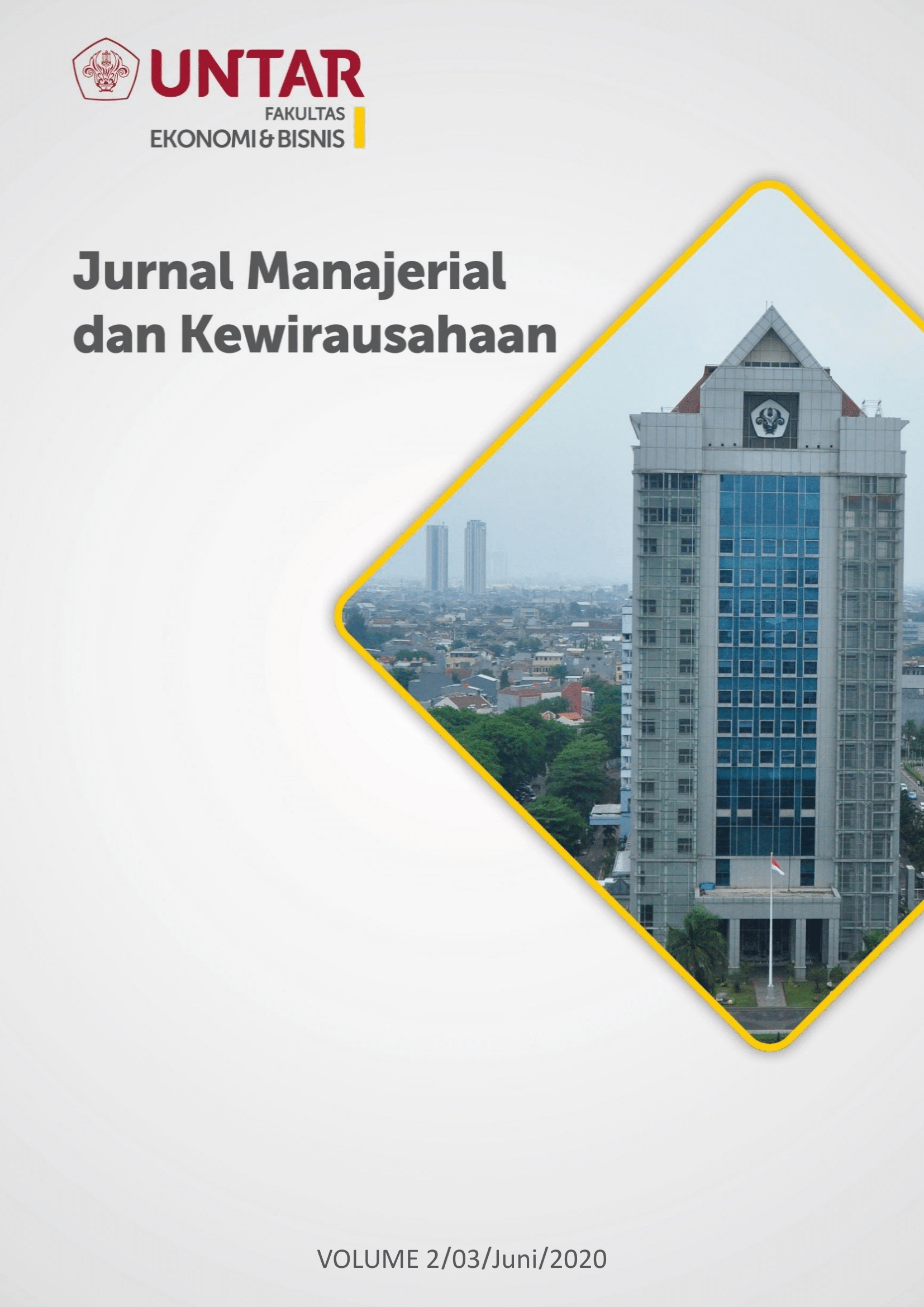Pengaruh Sikap Keuangan, Sosial, dan Pengetahuan Keuangan terhadap Perencanaan Keuangan Pribadi
Main Article Content
Abstract
This study aims to determine the effect of financial attitude, social influence, and financial knowledge to personal financial planning. Data collected by online questionnaire with sample technique judgement purposive sampling. Subject of this study is Millenial workers at Jakarta Barat. The result of this study is financial attitude, social influence, and financial knowledge has positive effect to personal financial planning. Hope next study can show another variables that have impact to personal financial planning.
Tujuan dari penelitian ini yaitu untuk mengetahui pengaruh dari sikap keuangan, sosial, dan pengetahuan keuangan terhadap perencanaan keuangan pribadi. Pengumpulan data dilakukan dengan menggunakan kuesioner secara online yang disebarkan dengan pemilihan sampel judgement purposive sampling. Subjek dari penelitian yaitu kalangan milenial yang telah bekerja di Jakarta Barat. Hasil dari penelitian ini yaitu bahwa sikap keuangan, sosial, dan pengetahuan keuangan berpengaruh secara positif terhadap perencanaan keuangan pribadi. Diharapkan penelitian selanjutnya mampu menunjukkan variabel lain yang mampu memberi pengaruh terhadap perencanaan keuangan pribadi.
Article Details
Section
This work is licensed under a Jurnal Muara Ilmu Ekonomi dan Bisnis Creative Commons Attribution-ShareAlike 4.0 International License.,/p>
References
Altfest, L. (2004). Personal Financial Planning: Origins, Developments, and a Plan for Future Direction. American Economist, 48(2), 53–60.
Asosiasi Fintech Indonesia. (2017). Persentase Fintech Indonesia Menurut Sektor Usaha (Retrieved from https://databoks.katadata.co.id/).
Charles Schwab. (2019). Modern Wealth Survey (Retrieved from www.schwab.com).
Deloitte Touche. (2019). The Deloitte Global Milennial Survey (Retrieved from https://databoks.katadata.co.id/).
Eddy S. W. Ng & Johnson, J. M. G. (2015). Millennials: who are they, how are they different, and why should we care?, (6), 121–137.
Ferdinand, A. (2014). Metode Penelitian Manajemen Pedoman Penelitian untuk Penulisan Skripsi Tesis dan Disertasi Ilmu Manajemen. Semarang: Badan Penerbit Universitas Diponegoro.
Filbert, R. (2016). Passive Income Strategy The Secret of Financial Freedom. Jakarta: PT Elex Media Komputindo.
Garman, E. T., Leech, I. E. & Grable, J. E. (1996). The Negative Impact Of Employee Poor Personal Financial Behaviors On Employers. Financial Counseling and Planning, Vol. 7.
Global Findex. (2014). Financial Inclusion Index (Retrieved from https://databoks.katadata.co.id/).
Guzman, F. & Paswan, A. (2019). Consumer Centric Antecedents to Personal Financial Planning. Journal of Consumer Marketing, 36(6), 858–868.
Hair, J. F., Sarstedt, M., Hopkins, L. & Kuppelwieser, V. G. (2014). Partial least squares structural equation modeling (PLS-SEM) An emerging tool in business research. European Business Review, 26(2).
Halim & Ishak. (2014). Post Election Behavior? Is it Possible? A Framework Based on Hirschman (1970) Model. Journal of basic and applied sciences, 8(12), 67-75.
Jamal, A. A. A., Ramlan, W. K., Karim, M. R. A., Mohidin, R. & Osman, Z. (2015). The Effects of Social Influence and Financial Literacy on Savings Behavior: A Study on Students of Higher Learning Institutions in Kota Kinabalu, Sabah. International Journal of Business and Social Science, 6(1), 110–119.
Jorgensen, B. L. & Savla, J. (2010). Financial Literacy of Young Adults: The Importance of Parental Socialization. Journal of Family Relations, 59(4), 465–478.
Lai, M. M. & Tan, W. K. (2009). An Empirical Analysis of Personal Financial Planning in an Emerging Economy. European Journal of Economics, Finance and Administrative Sciences, 16, 99–111.
Lange, P. A. M., Kruglanski, A. W. & Higgins, E. T. (2012). The Theory of Planned Behavior. Handbook of theories of social psychology, 1, 438-459.
Mahapatra, M. S., Raveendran, J., & De, A. (2016). Proposing the Role of Mental Accounting and Financial Cognition on Personal Financial Planning: A Study in Indian Context. Journal of Economic Policy & Research, 12(1), 62–73.
Murphy, D. S. & Yetmar, S. (2010). Personal Financial Planning Attitudes: A Preliminary Study of Graduate Students. Management Research Review, 33(8), 811–817.
Robb, A. C. & Woodyard, A. S. (2011). Financial Knowledge and Best Practice Behavior. Journal of Financial Counseling and Planning, 22(1), 60–70.
Santoso, E. (2016). 15 Tips Jitu Mencapai Financial Freedom. Jakarta: Grasindo.
Sekaran, M. & Bougie, R. (2017). Research Methods for Business: A Skill Building Approach Seventh Edition. United Kingdom: John Wiley & Sons Ltd.
Simoes, L. & Gouveia, L. B. (2008). Targeting the Millennial Generation. Journal of Public and Communication, 21, 1 – 10.
Spolter, S. W., Fiona, S., Rippe, C. & Gould, S. (2017). Integrating Affect, Cognition, and Culture in Hispanic Financial Planning. International Journal of Bank Marketing, 36(4), 726 – 743.
Statista. (2017). Transaksi Fintech Indonesia (Retrieved from https://databoks.katadata.co.id/).
Syaputra, I. D. (2018). Perkembangan dan Pengaruh Digital Financial Services sebagai Keuangan Inklusif terhadap Consumer Spending di Indonesia tahun 2015–2017. Disertasi. Universitas Indonesia, Depok.
Wang, A. (2009). Interplay of Investors’ Financial Knowledge and Risk Taking. The Journal of Behavioral Finance, 10, 204–213.
Widoatmodjo, S. (2015). Pengetahuan Pasar Modal untuk Konteks Indonesia. Jakarta: PT Elex Media Komputindo.

